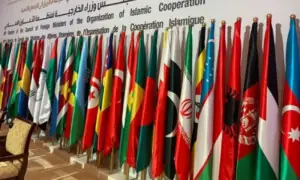Iranians seek guidance from ancient poetry of Hafez
2 min readWhen Iranians worry about life’s big questions, many seek answers in the works and wisdoms of Persia’s most revered poet, Hafez – sometimes with the help of a parakeet.
Retired housewife Mitra, 61, had questions about whether her son married the right woman, so she went to the tomb of Iran’s beloved 14th-century bard in the southern city of Shiraz.
Seeking guidance, she visited a fortune-teller there, one of many who offer advice with the help of Hafez’s collected works, a book of odes known as the Divan.
After sharing her concern, Mitra watched anxiously as the fortune-teller thumbed through the thick tome, opened it on a random page and pointed his finger at one verse.
He read it out and then explained its metaphors and mystical insights. Mitra’s face lit up – the message was positive, and domestic harmony lay ahead.
Read more
Saudi Arabia will not renew 80 year old petrodollar deal with US
“I finally did the consultation today for my son, because I had doubts on whether his marriage was a good decision,” she said in the garden of the Hafez mausoleum.
After the nod of approval for her daughter-in-law from within Iran’s ancient lyrical treasure trove, she said: “I finally regained hope”.
Some Iranian fortune-tellers, known as falgir, offer a special service to truly randomise the selection of the all-important Hafez verse.
Chirpy parakeets known as “love birds” hop across stacks of colourful envelopes that contain his enigmatic poems and pick one out with their tiny beaks.
Rich poetic tradition
As Hafez devotees thronged into the mausoleum to pay their respects, another person seeking advice was Hamidah, a 44-year-old chemistry professor.
“I always ask Hafez for help and consult him,” she said. “I can’t explain this with the laws of physics, but it’s a reality for me.”
Poetry enjoys immense popularity in Iran, where timeless verses on love and spirituality can be found woven into carpets, engraved in jewelry and emblazoned on street billboards.
The nation prides itself on its masters such as Rumi, Saadi, Khayyam and Ferdowsi, who wrote the epic Book of Kings, preserving Iran’s pre-Islamic heritage through mythical tales and legends.
For the latest news, follow us on Twitter @Aaj_Urdu. We are also on Facebook, Instagram and YouTube.
























Comments are closed on this story.